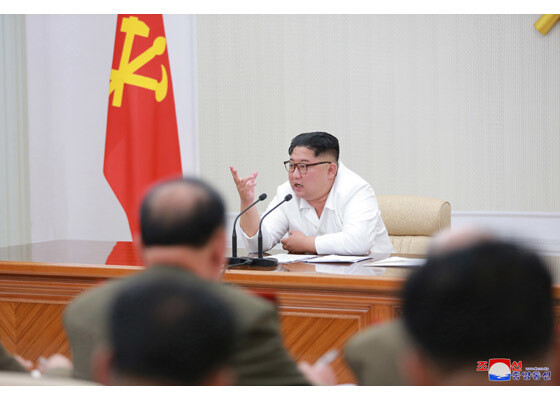hankyoreh
Links to other country sites 다른 나라 사이트 링크
Kim Jong-un announces reorganization of defense projects

North Korean leader Kim Jong-un discussed and decided upon “organizational measures that will usher in improvements through national defense projects” while presiding over an expanded meeting of the Workers’ Party of Korea (KPA) Central Military Commission (CMC), the Rodong Sinmun and Korean Central News Agency (KCNA) reported on May 18.
The reports suggest Kim finalized the strategy and methods for his “model” of defense reform during the meeting. It was the first expanded CMC meeting in the two years since one held immediately after the seventh Workers’ Party Congress in May 2016.
The reports did not include specifics on the meeting’s content. Experts speculated the key focus may have been on readjusting the “military first” principle in place since the 1960s following Pyongyang’s declaration of the “completion” of its two-track course of economic and nuclear development, and reworking the military’s direction and defense strategy for a “nuclear-free people’s armed forces.”
Indeed, the KCNA reported Kim as “emphasizing that the entire armed forces are to ensure execution of the decision from the third plenary session of the seventh CMC” during the meeting. The key decisions at the Apr. 20 plenary session were the declaration of the “completion” of the two-track course and adoption of a new strategy course of “channeling all capabilities into building a socialist economy.”
According to the KCNA, Kim “expressed his expectation and confidence that the people’s armed forces will honor the call to assume responsibility for both defense of the fatherland and the building of socialism and brilliantly execute its sacred mission and duty of [. . .] building the socialist economy.”
Reshuffling the top ranks
The meeting also included dismissals and appointments of some CMC members and officials within military organizations, the Rodong Sinmun reported. Many of the 13 CMC members besides Kim (Hwang Pyong-so, Pak Pong-ju, Pak Yong-sik, Ri Myong-su, Kim Yong-chol, Choe Pu-il, Kim Kyong-uk, Ri Yong-gil, So Hong-chan, Choe Ryong-hae, Ri Pyong-chol, Chong Kyong-taek, and Chang Kil-sung) appear to have been reshuffled, with Kim Jong-gak appointed the new People’s Army general politburo director in place of the departing Hwang, who returned to a position within the party.
The possible replacement of members of the military leadership, including People’s Army Chief of General Staff Ri Myong-su and/or Minister of the People’s Armed Forces Pak Yong-sik, cannot be ruled out either.
In internal terms, the meeting was held as a follow-up measure to the Apr. 20 plenary session. To the outside, however, it comes across strongly as preparation for a scheduled summit with the US and a follow-up measure to the Apr. 27 inter-Korean summit and issuance of the “Panmunjeom Declaration.”
For this reason, analysts said the military’s direction and defense policy could have been readjusted in line with the Declaration’s pledges for “complete denuclearization,” a “nuclear-free Korean Peninsula,” and “disarmament in a phased manner” to “establish a permanent and solid peace regime.”
“The ‘improvements throughout national defense projects’ that the North declared as its agenda can be translated as ‘defense reforms’ in South Korean terms,” said military expert and Kyungnam University Institute for Far Eastern Studies professor Kim Dong-yub.
“The key aspect is establishing a national defense strategy through a ‘nuclear-free people’s armed forces,’” Kim suggested.
By Lee Je-hun, senior staff writer
Please direct comments or questions to [english@hani.co.kr]

Editorial・opinion
![[Column] Park Geun-hye déjà vu in Yoon Suk-yeol [Column] Park Geun-hye déjà vu in Yoon Suk-yeol](https://flexible.img.hani.co.kr/flexible/normal/500/300/imgdb/original/2024/0424/651713945113788.jpg) [Column] Park Geun-hye déjà vu in Yoon Suk-yeol
[Column] Park Geun-hye déjà vu in Yoon Suk-yeol![[Editorial] New weight of N. Korea’s nuclear threats makes dialogue all the more urgent [Editorial] New weight of N. Korea’s nuclear threats makes dialogue all the more urgent](https://flexible.img.hani.co.kr/flexible/normal/500/300/imgdb/original/2024/0424/7317139454662664.jpg) [Editorial] New weight of N. Korea’s nuclear threats makes dialogue all the more urgent
[Editorial] New weight of N. Korea’s nuclear threats makes dialogue all the more urgent- [Guest essay] The real reason Korea’s new right wants to dub Rhee a founding father
- [Column] ‘Choson’: Is it time we start referring to N. Korea in its own terms?
- [Editorial] Japan’s rewriting of history with Korea has gone too far
- [Column] The president’s questionable capacity for dialogue
- [Column] Are chaebol firms just pizza pies for families to divvy up as they please?
- [Column] Has Korea, too, crossed the Rubicon on China?
- [Correspondent’s column] In Japan’s alliance with US, echoes of its past alliances with UK
- [Editorial] Does Yoon think the Korean public is wrong?
Most viewed articles
- 1‘We must say no’: Seoul defense chief on Korean, USFK involvement in hypothetical Taiwan crisis
- 2Will NewJeans end up collateral damage in internal feud at K-pop juggernaut Hybe?
- 3[Column] Park Geun-hye déjà vu in Yoon Suk-yeol
- 4Why Korea shouldn’t welcome Japan’s newly beefed up defense cooperation with US
- 5Thursday to mark start of resignations by senior doctors amid standoff with government
- 6N. Korean hackers breached 10 defense contractors in South for months, police say
- 7[Guest essay] The real reason Korea’s new right wants to dub Rhee a founding father
- 8[Column] ‘Choson’: Is it time we start referring to N. Korea in its own terms?
- 9Kim Jong-un expressed ‘satisfaction’ with nuclear counterstrike drill directed at South
- 10[Editorial] New weight of N. Korea’s nuclear threats makes dialogue all the more urgent